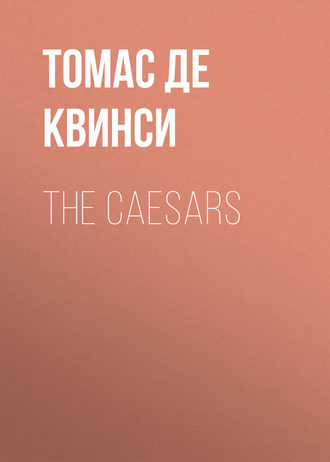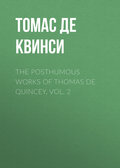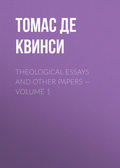
Томас де Квинси
The Caesars
But the same eastern training fell to the lot of Constantine, who was in effect his successor; [Footnote: On the abdication of Dioclesian and of Maximian, Galerius and Constantius succeeded as the new Augusti. But Galerius, as the more immediate representative of Dioclesian, thought himself entitled to appoint both Cæsars,—the Daza (or Maximus) in Syria, Severus in Italy. Meantime, Constantine, the son of Constantius, with difficulty obtaining permission from Galerius, paid a visit to his father; upon whose death, which followed soon after, Constantine came forward as a Cæsar, under the appointment of his father. Galerius submitted with a bad grace; but Maxentius, a reputed son of Maximian, was roused by emulation with Constantine to assume the purple; and being joined by his father, they jointly attacked and destroyed Severus. Galerius, to revenge the death of his own Cæsar, advanced towards Rome; but being compelled to a disastrous retreat, he resorted to the measure of associating another emperor with himself, as a balance to his new enemies. This was Licinius; and thus, at one time, there were six emperors, either as Augusti or as Cæsars. Galerius, however, dying, all the rest were in succession destroyed by Constantine.] and the Oriental tone and standard established by these two emperors, though disturbed a little by the plain and military bearing of Julian, and one or two more emperors of the same breeding, finally re-established itself with undisputed sway in the Byzantine court.
Meantime the institutions of Dioclesian, if they had destroyed Rome and the senate as influences upon the course of public affairs, and if they had destroyed the Roman features of the Cæsars, do, notwithstanding, appear to have attained one of their purposes, in limiting the extent of imperial murders. Travelling through the brief list of the remaining Cæsars, we perceive a little more security for life; and hence the successions are less rapid. Constantine, who (like Aaron's rod) had swallowed up all his competitors seriatim, left the empire to his three sons; and the last of these most unwillingly to Julian. That prince's Persian expedition, so much resembling in rashness and presumption the Russian campaign of Napoleon, though so much below it in the scale of its tragic results, led to the short reign of Jovian, (or Jovinian,) which lasted only seven months. Upon his death succeeded the house of Valentinian, [Footnote: Valentinian the First, who admitted his brother Valens to a partnership in the empire, had, by his first wife, an elder son, Gratian, who reigned and associated with himself Theodosius, commonly called the Great. By his second wife he had Valentinian the Second, who, upon the death of his brother Gratian, was allowed to share the empire by Theodosius. Theodosius, by his first wife, had two sons,—Arcadius, who afterwards reigned in the east, and Honorius, whose western reign was so much illustrated by Stilicho. By a second wife, daughter to Valentinian the First, Theodosius had a daughter, (half-sister, therefore, to Honorius,) whose son was Valentinian the Third.] in whose descendant, of the third generation, the empire, properly speaking, expired. For the seven shadows who succeeded, from Avitus and Majorian to Julius Nepos and Romulus Augustulus, were in no proper sense Roman emperors,—they were not even emperors of the West,—but had a limited kingdom in the Italian peninsula. Valentinian the Third was, as we have said, the last emperor of the West.
But, in a fuller and ampler sense, recurring to what we have said of Dioclesian and the tenor of his great revolutions, we may affirm that Probus and Carus were the final representatives of the majesty of Rome: for they reigned over the whole empire, not yet incapable of sustaining its own unity; and in them were still preserved, not yet obliterated by oriental effeminacy, those majestic features which reflected republican consuls, and, through them, the senate and people of Rome. That, which had offended Dioclesian in the condition of the Roman emperors, was the grandest feature of their dignity. It is true that the peril of the office had become intolerable; each Cæsar submitted to his sad inauguration with a certainty, liable even to hardly any disguise from the delusions of youthful hope, that for him, within the boundless empire which he governed, there was no coast of safety, no shelter from the storm, no retreat, except the grave, from the dagger of the assassin. Gibbon has described the hopeless condition of one who should attempt to fly from the wrath of the almost omnipresent emperor. But this dire impossibility of escape was in the end dreadfully retaliated upon the emperor; persecutors and traitors were found every where: and the vindictive or the ambitious subject found himself as omnipresent as the jealous or the offended emperor. The crown of the Cæsars was therefore a crown of thorns; and it must be admitted, that never in this world have rank and power been purchased at so awful a cost in tranquillity and peace of mind. The steps of Cæsar's throne were absolutely saturated with the blood of those who had possessed it: and so inexorable was that murderous fate which overhung that gloomy eminence, that at length it demanded the spirit of martyrdom in him who ventured to ascend it. In these circumstances, some change was imperatively demanded. Human nature was no longer equal to the terrors which it was summoned to face. But the changes of Dioclesian transmuted that golden sceptre into a base oriental alloy. They left nothing behind of what had so much challenged the veneration of man: for it was in the union of republican simplicity with the irresponsibility of illimitable power, it was in the antagonism between the merely human and approachable condition of Cæsar as a man, and his divine supremacy as a potentate and king of kings—that the secret lay of his unrivalled grandeur. This perished utterly under the reforming hands of Dioclesian. Cæsar only it was that could be permitted to extinguish Cæsar: and a Roman imperator it was who, by remodelling, did in effect abolish, by exorcising from its foul terrors, did in effect disenchant of its sanctity, that imperatorial dignity, which having once perished, could have no second existence, and which was undoubtedly the sublimest incarnation of power, and a monument the mightiest of greatness built by human hands, which upon this planet has been suffered to appear.






